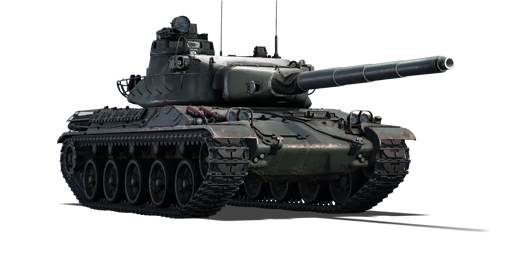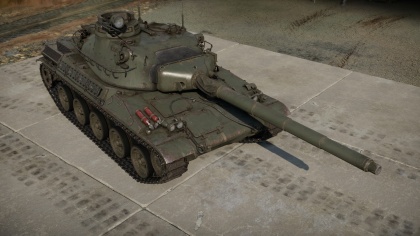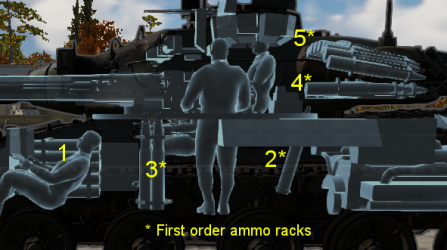Difference between revisions of "AMX-30"
(Are we still not doing periods on bulleted lists?) |
m (I remove periods from bullet statements, I feel they are just that, statements, they should be brief blurbs about the pro/con. If a full sentence is needed, it should possibly go in one of the other sections and expounded on.) |
||
| Line 15: | Line 15: | ||
Like the AMX-30 (1972), it lacks a stabilizer and has incredibly weak side armour, but the excellent HEAT shell, comparable to other nations' HEATFS shells, the reasonable front armour (most tanks will still one-shot you though) and the good mobility make up for it. | Like the AMX-30 (1972), it lacks a stabilizer and has incredibly weak side armour, but the excellent HEAT shell, comparable to other nations' HEATFS shells, the reasonable front armour (most tanks will still one-shot you though) and the good mobility make up for it. | ||
| − | The HEAT shell is comparable to other nations' HEATFS shells, and has a good penetration amount (400 mm flat), but will often bounce on angled surfaces. When the shell penetrates, it usually causes enough shrapnel to one-shot a tank. In a fight against lightly | + | The HEAT shell is comparable to other nations' HEATFS shells, and has a good penetration amount (400 mm flat), but will often bounce on angled surfaces. When the shell penetrates, it usually causes enough shrapnel to one-shot a tank. In a fight against lightly armoured vehicles, like SPAA, the HEAT round will often cause hull breaks. |
The armour only reaches 190 mm at some angled parts of the front, the turret goes 100mm at best, some rank I vehicles like the Panzer IV E could take you on frontally and easily win. | The armour only reaches 190 mm at some angled parts of the front, the turret goes 100mm at best, some rank I vehicles like the Panzer IV E could take you on frontally and easily win. | ||
| Line 25: | Line 25: | ||
== General info == | == General info == | ||
=== Survivability and armour === | === Survivability and armour === | ||
| − | <!--''Describe armour protection. Note the most well protected and key weak areas. Appreciate the layout of modules as well as the number and location of crew members. Is the level of armour protection sufficient, is the placement of modules | + | <!--''Describe armour protection. Note the most well protected and key weak areas. Appreciate the layout of modules as well as the number and location of crew members. Is the level of armour protection sufficient, is the placement of modules helpful for survival in combat?'' |
''If necessary use a visual template to indicate the most secure and weak zones of the armour.''--> | ''If necessary use a visual template to indicate the most secure and weak zones of the armour.''--> | ||
| Line 92: | Line 92: | ||
== Armaments == | == Armaments == | ||
=== Main armament === | === Main armament === | ||
| − | <!--''Give the reader information about the characteristics of the main gun. Assess its effectiveness in a battle based on the reloading speed, ballistics and the power of shells. Do not forget about the | + | <!--''Give the reader information about the characteristics of the main gun. Assess its effectiveness in a battle based on the reloading speed, ballistics and the power of shells. Do not forget about the flexibility of the fire, that is how quickly the cannon can be aimed at the target, open fire on it and aim at another enemy. Add a link to the main article on the gun: <code><nowiki>{{main|Name of the weapon}}</nowiki></code>. Describe in general terms the ammunition available for the main gun. Give advice on how to use them and how to fill the ammunition storage.''--> |
{{main|CN-105-F1 (105 mm)}} | {{main|CN-105-F1 (105 mm)}} | ||
| Line 207: | Line 207: | ||
=== Machine guns === | === Machine guns === | ||
| − | <!--''Offensive and anti-aircraft machine guns not only allow you to fight some aircraft | + | <!--''Offensive and anti-aircraft machine guns not only allow you to fight some aircraft but also are effective against lightly armoured vehicles. Evaluate machine guns and give recommendations on its use.''--> |
{{main|Browning M2 (12.7 mm)|AAN-F1 (7.62 mm)}} | {{main|Browning M2 (12.7 mm)|AAN-F1 (7.62 mm)}} | ||
| Line 256: | Line 256: | ||
* The HEAT shell is comparable to other HEATFS shells of contemporary tanks and can theoretically penetrate up to 400 mm on flat armour | * The HEAT shell is comparable to other HEATFS shells of contemporary tanks and can theoretically penetrate up to 400 mm on flat armour | ||
* Fairly good mobility | * Fairly good mobility | ||
| + | |||
'''Cons:''' | '''Cons:''' | ||
* No kinetic ammunition. | * No kinetic ammunition. | ||
| Line 263: | Line 264: | ||
* Lacks the 20mm Autocannon of its tree counterpart, the [[AMX-30 (1972)]] | * Lacks the 20mm Autocannon of its tree counterpart, the [[AMX-30 (1972)]] | ||
* Rear turret bustle is pretty much lathered with ammunition when filled | * Rear turret bustle is pretty much lathered with ammunition when filled | ||
| − | * Fuel tanks everywhere in hull, front and sides, likely to cause fire | + | * Fuel tanks everywhere in hull, front and sides, likely to cause a fire |
* HEAT shell will be stopped by any kind of obstacle, which includes (but is not limited to) bushes, trees, fences, wooden houses, etc | * HEAT shell will be stopped by any kind of obstacle, which includes (but is not limited to) bushes, trees, fences, wooden houses, etc | ||
Revision as of 04:00, 1 February 2019
Contents
| This page is about the premium/pack AMX-30. For other uses, see AMX-30 (Disambiguation) |
Description
The AMX-30 is a gift Rank V French medium tank
with a battle rating of 8.0 (AB/RB/SB). It was introduced in Update 1.77 "Advancing Storm".
The AMX-30 is a similar tank to its younger counterpart, the AMX-30 (1972), with the 20 mm coaxial autocannon replaced by a 12.7 mm heavy machinegun, still able to deal with lightly armoured targets such as SPAA, but doesn't deal the extra punch of an autocannon.
Like the AMX-30 (1972), it lacks a stabilizer and has incredibly weak side armour, but the excellent HEAT shell, comparable to other nations' HEATFS shells, the reasonable front armour (most tanks will still one-shot you though) and the good mobility make up for it.
The HEAT shell is comparable to other nations' HEATFS shells, and has a good penetration amount (400 mm flat), but will often bounce on angled surfaces. When the shell penetrates, it usually causes enough shrapnel to one-shot a tank. In a fight against lightly armoured vehicles, like SPAA, the HEAT round will often cause hull breaks.
The armour only reaches 190 mm at some angled parts of the front, the turret goes 100mm at best, some rank I vehicles like the Panzer IV E could take you on frontally and easily win.
The mobility, which is good but unexceptional, can be both a blessing and a curse, since, due to said lack of stabilizer, you will not be able to shoot accurately while on the move.
Be wary, also, of your ridiculously tall cupola, you can be destroyed even if you are behind cover just because of it.
General info
Survivability and armour
Armour type:
- Cast homogeneous armour
- Rolled homogeneous armour (Hull roof, Hull sides)
| Armour | Front (Slope angle) | Sides | Rear | Roof |
|---|---|---|---|---|
| Hull | 79 mm (57-68°), 50 mm (52-76°) Front glacis 79 mm (0-57°), 30 mm (75°) Lower glacis |
35-57 mm (0-35) 30 mm Bottom 25 mm (70°) Belly |
30 mm (10°) Top 30 mm Center 25 mm (70°) Bottom |
15 mm 8 mm Engine grille |
| Turret | 30-150 mm (0-79°) Gun mantlet 30 mm (61-75°) Turret front top |
41.5 mm (19-47°) | 30 mm (1-64°) 20 mm (54-64°) Turret underside |
20 mm |
| Armour | Sides | Roof | ||
| Cupola | 60 mm | 20 mm |
Notes:
- Suspension wheels are 15 mm thick while tracks are 20 mm thick.
Mobility
| Mobility characteristic | ||
|---|---|---|
| Weight (tons) | Add-on Armour weight (tons) |
Max speed (km/h) |
| 36.0 | N/A | 72 (AB) |
| 65 (RB/SB) | ||
| Engine power (horsepower) | ||
| Mode | Stock | Upgraded |
| Arcade | 1,116 | 795 |
| Realistic/Simulator | 637 | 720 |
| Power-to-weight ratio (hp/ton) | ||
| Mode | Stock | Upgraded |
| Arcade | 31.00 | __.__ |
| Realistic/Simulator | 17.69 | 20.00 |
Armaments
Main armament
| 105 mm CN-105-F1 | |||||
|---|---|---|---|---|---|
| Capacity | Vertical guidance |
Horizontal guidance |
Stabilizer | ||
| 50 | -8°/+20° | ±180° | N/A | ||
| Turret rotation speed (°/s) | |||||
| Mode | Stock | Upgraded | Prior + Full crew | Prior + Expert qualif. | Prior + Ace qualif. |
| Arcade | 17.9 | 24.7 | 28.9 | 33.2 | 35.3 |
| Realistic | 17.9 | 22.1 | 25.7 | 28.4 | 30.0 |
| Reloading rate (seconds) | |||||
| Stock | Prior + Full crew | Prior + Expert qualif. | Prior + Ace qualif. | ||
| 8.7 | 7.7 | 7.1 | 6.7 | ||
Ammunition
| Penetration statistics | |||||||
|---|---|---|---|---|---|---|---|
| Ammunition | Type of warhead |
Penetration in mm @ 90° | |||||
| 10m | 100m | 500m | 1000m | 1500m | 2000m | ||
| OCC 105 F1 | HEAT | 400 | 400 | 400 | 400 | 400 | 400 |
| OE 105 F1 Mle.60 | HE | 25 | 25 | 25 | 25 | 25 | 25 |
| Shell details | ||||||||||
|---|---|---|---|---|---|---|---|---|---|---|
| Ammunition | Type of warhead |
Velocity in m/s |
Projectile Mass in kg |
Fuse delay
in m: |
Fuse sensitivity
in mm: |
Explosive Mass in g (TNT equivalent): |
Normalization At 30° from horizontal: |
Ricochet: | ||
| 0% | 50% | 100% | ||||||||
| OCC 105 F1 | HEAT | 1,000 | 11 | 0.0 | 0.1 | 1,020 | +0° | 62° | 69° | 73° |
| OE 105 F1 Mle.60 | HE | 700 | 12 | 0.1 | 0.1 | 2,000 | +0° | 79° | 80° | 81° |
| Smoke characteristic | ||||||
|---|---|---|---|---|---|---|
| Ammunition | Velocity in m/s |
Projectile Mass in kg |
Screen radius in m |
Screen time in s |
Screen hold time in s: |
Explosive Mass in g (TNT equivalent): |
| OFPH 105 F1 | 700 | 11 | 20 | 5 | 25 | 50 |
Ammo racks
| Full ammo |
1st rack empty |
2nd rack empty |
3rd rack empty |
4th rack empty |
5th rack empty |
6th rack empty |
Visual discrepancy |
|---|---|---|---|---|---|---|---|
| 50 | XX (X+) | (+) | (+) | (+) | (+) | (+) | no |
Machine guns
| 12.7 mm M2HB | ||||||
|---|---|---|---|---|---|---|
| Coaxial mount | ||||||
| Capacity (Belt capacity) | Fire rate (shots/minute) |
Vertical guidance |
Horizontal guidance | |||
| 800 (200) | 577 | -0°/+20° | N/A | |||
| 7.62 mm AAN-F1 | ||||||
|---|---|---|---|---|---|---|
| Pintle mount | ||||||
| Capacity (Belt capacity) | Fire rate (shots/minute) |
Vertical guidance |
Horizontal guidance | |||
| 2,000 (100) | 900 | -10°/+45° | ±120° | |||
Usage in the battles
This tank cannot stand a fight on its own, therefore, only two tactics are viable.
First (the most dangerous), you can try getting behind the enemy lines and attacking the SPAA, you will often get hull breaks thanks to the HEAT round, be wary of bushes however, they will stop your HEAT shells, you can attempt to take on enemy tanks, provided it is from the side, and you can hit the ammunition (HEAT will rarely cause fire, and the weak shrapnel makes it hard to take out entire crews).
Second, stay with your team, ideally behind another tank (do NOT lead the formation, it's a death sentence), use your HEAT shells to disable tracks or take out one or two crew members and ease the task of your teammates.
Compared to the vehicles it will face, the AMX-30 ranges from Inferior to Harmless, every enemy vehicle should be regarded the same way, as major threats that will destroy it in a couple of hits at best. Aiming for the ammunition is the only way for you.
Pros and cons
Pros:
- Moderate front armour
- Fuel tank armour surrounding frontal ammo rack, much like Cold War Russian tanks
- The HEAT shell is comparable to other HEATFS shells of contemporary tanks and can theoretically penetrate up to 400 mm on flat armour
- Fairly good mobility
Cons:
- No kinetic ammunition.
- Very tall cupola
- Only 30-35mm thick side armour
- Does not have a stabilizer
- Lacks the 20mm Autocannon of its tree counterpart, the AMX-30 (1972)
- Rear turret bustle is pretty much lathered with ammunition when filled
- Fuel tanks everywhere in hull, front and sides, likely to cause a fire
- HEAT shell will be stopped by any kind of obstacle, which includes (but is not limited to) bushes, trees, fences, wooden houses, etc
History
Describe the history of the creation and combat usage of the ground vehicle in more detail than in the introduction. If the historical reference turns out to be too big, take it to a separate article, taking a link to an article about the vehicle and adding a block "/historical reference" (example: https://wiki.warthunder.com/Name-vehicles/historical reference) and add a link to it here using the main template. Be sure to include links to sources at the end of the article.
Media
Skins and camouflages for the AMX-30 from live.warthunder.com.
References
Read also
Sources
| France medium tanks | |
|---|---|
| M4 Derivatives | M4A1 (FL10) · M4A4 (SA50) |
| AMX-50 | AMX M4 · AMX-50 (TOA100) · AMX-50 (TO90/930) |
| AMX-30 | AMX-30 · AMX-30 (1972) · AMX-30B2 · AMX-30B2 BRENUS · AMX-30 ACRA · AMX-30 Super |
| AMX-32/40 | AMX-32 · AMX-32 (105) · AMX-40 |
| Leclerc | Leclerc · Leclerc S2 · Leclerc SXXI · Leclerc AZUR |
| Other | D2 · S.35 · Lorraine 40t |
| Germany | Panther "Dauphiné" |
| USA | ▄M4A1 · ▄M4A3 (105) · ▄M4A4 · ▄M26 |
| France premium ground vehicles | |
|---|---|
| Light tanks | AMD.35 (SA35) · H.39 "Cambronne" · LVT-4/40 · AMX-13 (SS.11) · AMX-13-M24 · E.B.R. (1954) · E.B.R. (1963) · VBCI-2 (MCT30) |
| Medium tanks | M4A1 (FL10) · Panther "Dauphiné" · AMX-30 · AMX-30 Super · AMX-50 (TO90/930) |
| Heavy tanks | B1 ter · 2C bis · Somua SM |
| Tank destroyers | Lorraine 155 Mle.50 |






